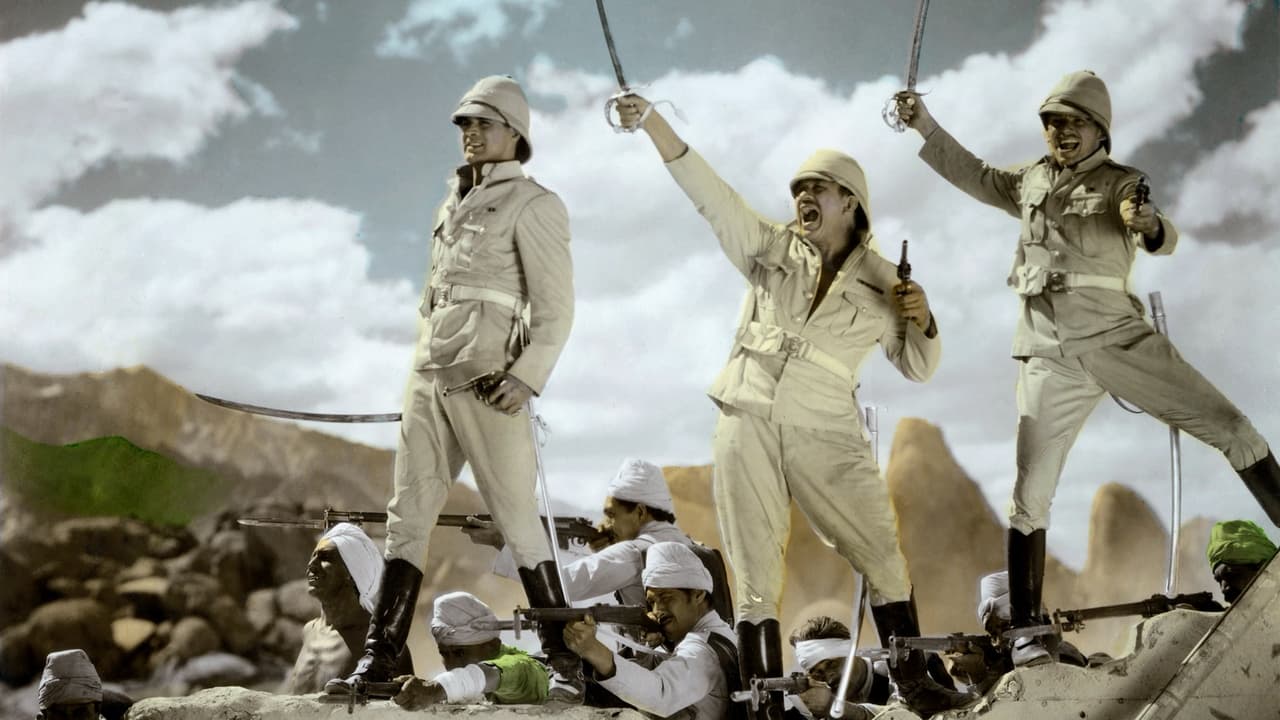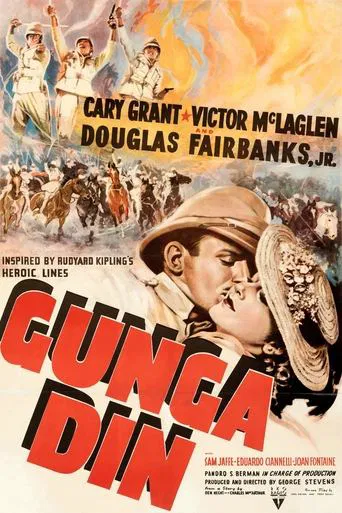

Copyright 27 January 1939 by RKO Radio Pictures, Inc. New York opening at the Radio City Music Hall: 26 January 1939. U.S. release: 17 February 1939. U.K. release: March 1939. Australian release: 4 May 1939. 12 reels. 117 minutes.NOTES: Locations in Lone Pine, California. Also Chatsworth and Lake Sherwood. Negative cost: $1,909,669.28. RKO's top box=office attraction of 1938-39, the movie was successfully re-issued in the mid-1940s.COMMENT: The original "Soldiers Three" does not quite deserve its reputation as a top film of the year. Obviously inspired by the success of "Lives of a Bengal Lancer" (some of the impressive crowd footage is even culled from that film), it does not hold a candle to Hathaway's film in any respect save one — the photography by Joseph August with its searing brightness and lack of contrast can be compared favorably alongside the more artistic work of Charles Lang on Bengal Lancer. Both are atmospheric, yet achieve their effects in different ways. Otherwise, "Gunga Din" comes off second best in all departments — acting with a bland Douglas Fairbanks Jr, a ridiculous, exaggerated, excitable Cockney from Cary Grant and Victor McLaglen as rambunctious to a degree that he has elevated into a mannerism, cannot compare with Franchot Tone, Cooper and Cromwell; just as Montagu Love cannot compare with Sir Guy Standing or Abner Biberman with Monte Blue. Admittedly, Eduardo Ciannelli is very effective as the Thug high priest, and Sam Jaffe is suitably funny-ethnic in the title role. Expansively produced, boasting good battle scenes, action and atmosphere, the movie tends to be over-talkative in its full version and I'm not surprised it was cut when re-issued. Joan Fontaine has a small clinging-vine part. Stevens' direction has lots of good camera set-ups, but lacks the dynamism that director Henry Hathaway brought to "Lives of a Bengal Lancer".
... View MoreBased on a Rudyard Kipling poem, this is a very entertaining adventure film with an excellent cast including Cary Grant, Douglas Fairbanks Jr., Victor McLaglen, Sam Jaffe (in the title role), Eduardo Ciannelli and Joan Fontaine. Directed by George Stevens, after Howard Hawks was removed when Bringing Up Baby (1938) bombed at the box office; it was added to the National Film Registry in 1999. Oscar nominated for its Cinematography (the first of two unrewarded Academy Award nominations for Joseph August). Ben Hecht and Charles MacArthur's story was adapted by Joel Sayre and Fred Guiol.Grant, Fairbanks Jr., and McLaglen play three Sergeants in the British Army that find themselves defending the Empire against an uprising in India. Jaffe plays a local who's befriended, primarily by Grant, that wants to join up and serve in the military unit he idolizes. Fairbanks Jr.'s character is engaged to Fontaine's and, since his service time is almost up, is replaced in the trio by another (played by Robert Coote) ... this is, until the action begins.Great set pieces (including a hanging bridge over a deep canyon), battle sequences, dialogue, and even an elephant, with humor mixed in, make this yet another of the many must-see films from that great classic movie year of 1939. #74 on AFI's 100 Most Inspiring Movies list.
... View MoreThere's a segment of the population that loves this stuff. Generally speaking it consists of men who like watching other men get nearly naked together and then roll around on the floor while their muscular bodies glisten with sweat and oily residue. Intermingled with lots of brotherly slaps on the back and an unhealthy overdose of deep hearty laughter. It's all very rousing and robust with enough male bonding to satisfy all but the most extreme closet cases. This is a movie that men can introduce to their sons as a rite of manhood, a demonstration of all that is powerfully good about penile worship while brimming over with natural husky maleness.
... View MoreI'm guessing that back in the day movies that were just Boy's Own Paper in celluloid form were highly popular. Time sure hasn't been kind to this example and it's almost impossible to detect any traces of a George Stevens 'touch', in fact this effort could have been directed by any half competent journeyman. Only in Hollywood would they cast an Italian actor who specialized in Mafiosi type gangsters (Eduardo Cianelli) as not only an Indian but the leader of the Thuggee cult. This is essentially Sergeants Three with trumpets so we get the usual 'knockabout' fun/rivalry between three sergeants in the Raj; oh, look, Ma, aren't they Scamps. Inevitably they have to get in real trouble along about Reel #8 and just as inevitably get themselves out of it and in passing save the regiment from being massacred. You want it? Take it, with my blessing.
... View More